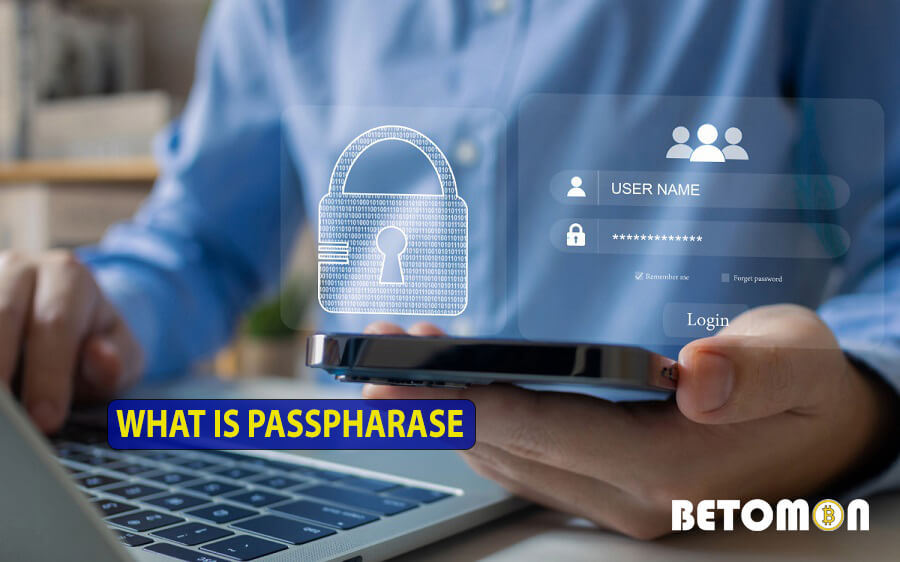Passphrases assist users in safeguarding account or cryptocurrency wallet access, which need to be kept private and confidential.
What is a passphrase?
To safeguard the user’s private key or encrypted wallet account, a passphrase—also referred to as a seed phrase or recovery phrase—is a combination of letters, numbers, and special characters. Recovery phrases, in contrast to private keys, frequently have a longer capacity and might contain words to generate secure passwords, making it more difficult for hackers to employ brute force attacks (password guessing attacks).
In order to aid users in recovering their accounts in the event that they forget their password or wish to reinstall the wallet on a different device, the majority of cryptocurrency wallets employ a seed phrase consisting of 12 or 14 random syllables. Therefore, in order to prevent losing their cryptocurrency holdings and personal data, investors must securely store their password and not divulge it to third parties.

In 2016, the cryptocurrency recovery business Unciphered revealed a Randstorm passphrase vulnerability. When the business attempted to get the recovery phrase for investor Nick Sullivan, it found the mistake.
Accordingly, Randstorm only permits the generator to produce random recovery phrases from thousands of words, as opposed to producing seed phrases from millions of words. This facilitates the process by which hackers can quickly obtain the user’s passphrase and steal assets. Approximately 1.1 million bitcoin wallets experienced this issue, resulting in thousands of users losing their tokens.
Benefits and drawbacks of passphrase
Benefits
- Enhanced security: By forcing users to input a few secret phrases in order to access accounts or ownership, passphrase adds an extra degree of protection, enhancing security.
- Easy to remember: Easy to recall: Since seed phrases consist of short sentences or words, they are frequently easier to recall than private keys.
- Easy to change: The security management method is flexible and convenient because it is easier to change the password than the private key without affecting other crucial data.
Drawbacks
- Forgetfulness: Due to its simplicity of recall, investors run the risk of forgetting the recovery phrase and losing access to their accounts or ownership of digital assets.
- Hacked: If a passphrase is not correctly chosen and stored, it can be compromised by network intrusion techniques or detecting bots, particularly on devices linked to local area networks (LANs) or cloud computing services.
- Fraud: By creating websites, decentralized apps, social media accounts, emails, and other content that closely mimics the genuine website, criminals can steal passphrases.

How to securely store a passphrase
- Physical security: Investors have the option to write down the passphrase or keep it on non-networked hard drives or other physical security devices. Storing raises the risk of a hacker attack for devices with internet connectivity.
- Encryption: Before storing the passphrase on a computer or other specialized device, users can encrypt it manually or using software. Users must make sure, nevertheless, that the encryption and password management software does not save any data on the cloud. Investors have the option to substitute synonyms or antonyms for a few characters in the seed phrase.
- Dispersing the passphrase: To prevent loss or theft, owners should break the recovery phrase up into multiple sections and keep them in separate locations.
- Be cautious while using unfamiliar websites and applications: Avoid sharing information with community administrators or entering passphrases on dubious websites or apps. It is essential to thoroughly examine the platform URLs in order to prevent falling for phony online scams.
Compare private key and passphrase
Same
- Form of security: In the crypto industry, user information, encrypted assets, and account ownership are all safeguarded using passphrases and private keys.
- Random: The two security measures, which guarantee security when utilizing the wallet or account, are both randomly produced by the platform system or specified by the investor.
Difference
-
Data type:
A private key is a pair of keys or a random string of symbols in a public key encryption system.
Passphrase is usually an easy-to-remember phrase.
-
Function:
In the blockchain system, transactions are signed and ownership is established using private keys.
A passphrase is needed in order to authenticate or unlock an account.
-
Security:
Total control over encrypted assets is contingent upon the private key.
Passphrases can be used alone or in conjunction with other security measures, including two-factor authentication.
Conclusion
A passphrase is a combination letters and numbers of that enables users to retrieve their account in the event that they misplace their password or wish to reinstall the wallet on a different device. So, in the crypto industry, it is crucial to carefully store the seed phrase in order to guarantee the security of encrypted assets.
Betomon is a website that reviews, analyzes and knowledge shares about safe and stable financial investment projects on the theme of crypto forex blockchain… Projects to make money online for free
Visit the website betomon.com or register to receive the latest information here.




